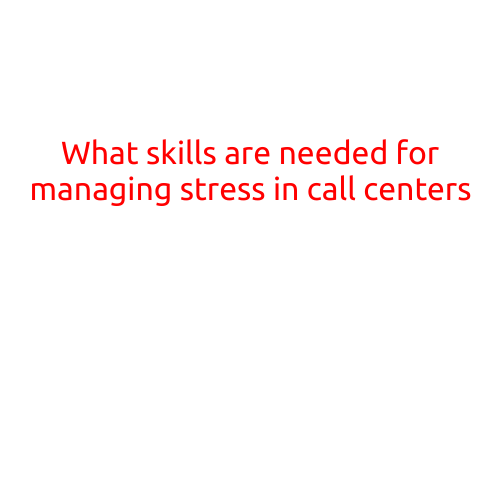
What Skills are Needed for Managing Stress in Call Centers?
Call center environments can be notoriously stressful, with agents dealing with high-pressure situations, tight deadlines, and a constant influx of customer inquiries. Effective stress management is crucial to maintaining employee well-being, improving job satisfaction, and increasing productivity. In this article, we’ll explore the essential skills needed for managing stress in call centers.
Communication Skills
Clear and effective communication is vital in call centers. Agents must communicate efficiently with customers, colleagues, and supervisors to resolve issues and resolve disputes. Strong communication skills help agents articulate their concerns, set boundaries, and seek help when needed. Proficiency in active listening, empathy, and conflict resolution can also reduce stress and improve outcomes.
Emotional Intelligence
Emotional intelligence (EI) is the ability to recognize and manage one’s emotions and those of others. EI is essential for call center agents, as they often deal with frustrated customers and conflicting priorities. By developing EI, agents can better understand and manage their own emotions, reducing stress and improving relationships with customers.
Self-Awareness
Self-awareness is the ability to recognize your own strengths, weaknesses, and emotional triggers. In call centers, self-awareness helps agents identify their own stressors, such as long hours or difficult customers, and develop strategies to mitigate them. Self-awareness also enables agents to prioritize their well-being and seek support when needed.
Time Management
Effective time management is crucial in call centers, where agents must handle multiple tasks simultaneously. By prioritizing tasks, setting realistic goals, and minimizing distractions, agents can reduce stress and stay focused on high-priority tasks.
Adaptability
Call center environments are constantly changing, with shifting customer demands, technical issues, and unexpected disruptions. Agents who are adaptable can quickly adjust to these changes, reducing stress and improving overall performance.
Boundary Setting
Setting healthy boundaries is essential for call center agents, who often work long hours and experience blurred lines between work and personal life. By establishing clear boundaries, agents can protect their personal time, prioritize self-care, and reduce the risk of burnout.
Resilience
Resilience is the ability to bounce back from stress, adversity, or setbacks. In call centers, resilience helps agents cope with the demands of their job, build confidence, and maintain motivation over time.
Techniques for Managing Stress
While these skills are essential for managing stress in call centers, additional techniques can help agents cope with the demands of their job. Some effective stress-reducing techniques include:
- Deep breathing exercises
- Mindfulness meditation
- Physical activity, such as yoga or walking breaks
- Social support networks, such as team-building activities or mentorship programs
- Self-care routines, such as journaling or reading
Conclusion
Managing stress in call centers requires a unique set of skills, from effective communication and emotional intelligence to self-awareness and boundary setting. By developing these essential skills and incorporating stress-reducing techniques into their daily routine, call center agents can reduce stress, improve job satisfaction, and increase productivity. By prioritizing their well-being, call center agents can provide exceptional customer service while maintaining a healthy work-life balance.





